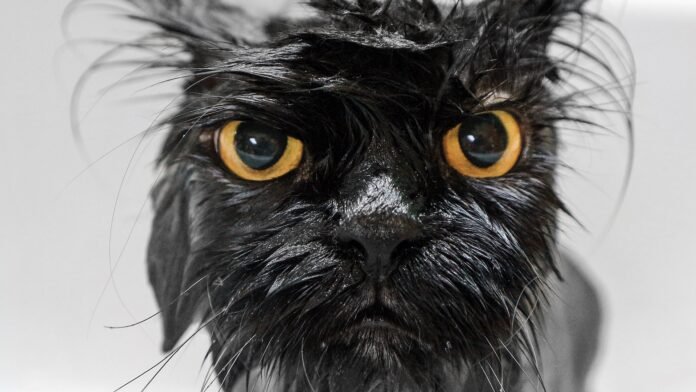One of the most enduring stereotypes about domestic cats is that they absolutely despise getting wet. From frantically scrambling out of the bathtub to recoiling at the mist from a spray bottle, cats and water always seem to be at odds. And while some felines might not mind a swim — certain breeds, including Turkish Vans and Maine coons tend to adore the water — many cat owners know that this stereotype still rings true for their fur babies.
But why do cats hate water so much?
There isn’t any dedicated scientific research on cats’ relationship with water. But there are some potential clues in cats’ biology and evolutionary history, experts say, as well as in their individual upbringing.
Kristyn Vitale, an animal behaviorist and founder of Maueyes Cat Science and Education, suspects that the ancestor of the domestic cat, the African wildcat (Felis silvestris lybica), may play a big role in why modern domestic cats avoid water.
Some wild cats, such as tigers, fishing cats and jaguars, like to swim in order to escape bugs, cool off and even ambush their prey. But the African wild cat mostly lives in desert environments, where it rarely encounters large bodies of water or swims.
“They are not particularly known for hunting near water or within the water,” Vitale told Live Science in an email. “A large proportion of the African wildcat’s diet is made up of terrestrial animals, like rodents. Given this, it is not surprising that domestic cats don’t really seek out water. It is just not something this species was built to do.”
However, Jonathan Losos, a professor of biology at Washington University in St. Louis and author of “The Cat’s Meow: How Cats Evolved from the Savanna to Your Sofa” (Viking, 2023), told Live Science in an email he isn’t totally convinced by this theory. He pointed out that just because an animal is from a desert doesn’t mean it fears water, and that the range of African wildcats also extends to some less arid habitats — meaning some members of the species do encounter water in their lifetimes.
Jennifer Vonk, an animal cognition expert at Oakland University, brought up another potential reason house cats don’t like water: being wet is physically uncomfortable and can potentially disrupt their sense of smell.
Related: Why do cats make a weird face after smelling something?
“Their fur does become waterlogged and make movement more cumbersome, which probably leaves them feeling vulnerable,” Vonk told Live Science in an email.
Water can also mask a cat’s natural odor, or bring with it new smells that cats are sensitive to. Cats may be able to detect chemical cues in tap water that they find unpleasant, Vonk said, and Vitale noted that getting wet may obscure a cat’s natural pheromones, which could cause distress.
Ultimately, cats’ hatred of water may not stem from a single source — it’s probably a blend of multiple factors.
“It is likely a combination of being a natural aversion and a learned behavior,” said Vitale.
On that note, a kitten’s early experiences could play a big role in how they feel about water for the rest of their lives. While there’s no direct research about whether exposing kittens to water makes them like it more, cat experts do know that exposing kittens to different sights, sounds, scents, textures and experiences helps them become more confident adults. This process is called socialization, and Vitale said it could apply to water as well.
“It is likely that if a kitten grew up around water, they would be more comfortable around water as an adult,” she explained. “With that said, every cat is an individual. Even with water exposure, some kittens may still show water aversion, while other kittens who have never been exposed to water might enjoy it.”
Cat quiz: Can you get a purr-fect score?






